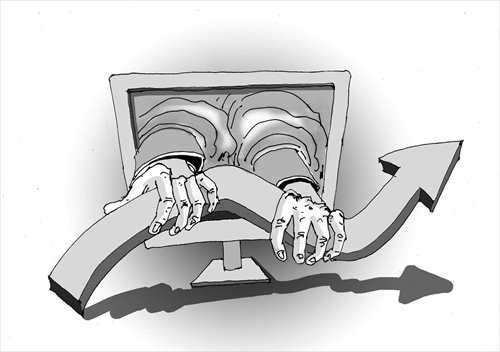Role of rumors in Chinese mainland stock market drop a cause of concern
Speculators using false information to make profits

Illustration: Luo Xuan/GT
As lessons are learned in the wake of efforts to ease the slump in the stock market, the role rumors played during the crash is worthy of attention.
In the absence of any sudden deterioration in economic fundamentals, financial market turmoil is usually caused by unfavorable rumors that are lacking in facts and that can shatter the confidence of market participants. These rumors push retail investors toward the irrational "herd behavior" of panic selling, forming a vicious cycle of falling securities prices, more panic selling, and further drops in securities prices, leading to self-fulfilling expectations of a crash. In China's current situation, highly accessible tools like the Internet, Weibo, WeChat and smartphones have facilitated the spread of information, including false rumors.
When there is a mechanism based on rumors that can lead to market shocks, speculators with ulterior motives will deliberately create and spread rumors in order to profit from their effects. And if speculators possess certain economic and political advantages, their ability to guide the market participants will be enlarged accordingly. During the recent crash, there were a lot of online posts that claimed to be from institutional organizations or even government bodies going viral on the Internet. And after several days of market rescue efforts from the authorities, some online posts claiming to be from brokerages even criticized the government's efforts as a "stampede-style bailout."
As market sentiment remained fragile, the common mentality among retail investors whose funds were stuck in the market was to hope that the "national team" of central authorities and regulatory bodies would be able to boost the stock prices of their holdings. In the initial days of the market rescue efforts, some suggested that the government would only save large-cap stocks instead of smaller listed companies. In fact, even with unlimited liquidity support from China's central bank, lifting all stocks would not have been possible.
Even if it had been possible, such an action might have encouraged further risk-taking by market participants, and excessive liquidity would bring side effects in the future. For various reasons, mid-cap and small-cap stocks are more volatile than large blue-chip stocks, and investors in smaller companies are more inclined toward speculative trading.
The efforts to stabilize the market were for the nation's benefit, but some rumors suggested there were also cynical motives. Hence it is to be expected that after the dust settles, there may be criticism that the government is profiting by having injected rescue funds into the market when prices were low. In fact, the government's intervention in the financial market was a defense measure. Only by buying low and selling high can the national team play the role of calming the market. If it suffered losses by buying high and selling low, the rescue fund would only encourage a wave of speculation.
During the crash, the major short sellers were not foreign institutions, but the effects of foreign investment in the market are still an area of potential concern. China's economy is already the second-largest in the world and it is very likely to become the largest, so Chinese stock market turbulence has triggered broader volatility in securities, commodities and foreign exchanges around the globe. This raises the question of whether international institutions might use the importance of China's market to take advantage of cross-market arbitrage, or even cross-market manipulation.
This is what China and other countries should look into. Under China's current situation, the probability of foreign direct manipulation of the Chinese market has been greatly reduced, but the possibility of foreign investors using rumors about Chinese market turmoil to manipulate overseas markets has greatly increased.
The author is a research fellow at the Chinese Academy of International Trade and Economic Cooperation. bizopinion@globaltimes.com.cn
Newspaper headline: Role of rumors in market drop a cause of concern